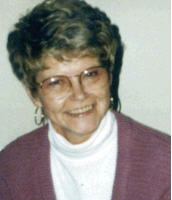Montgomery County Women's History Archive:
40 Women of Historical Significance in Montgomery County
Ingrid McKee
Ingrid U. McKee was born in Latvia, where her father was in the Latvian army. After the Soviet take-over, two-year old Ingrid and her family found themselves in a displaced person’s camp in Germany. There, a kindly US soldier befriended the little girl and helped sponsor the family so that Ingrid, her mother and grandmother could move to Baltimore in 1951. Later, her father was able to join the family.
Although she only started learning English in third grade, by sixth grade, McKee received the American Legion’s Award for Best Student. She graduated from Kenwood High School in Baltimore with several honors and awards. She attended the University of Maryland (UMD) with an interest in dentistry. However, a fateful physics class forced her to change her major to sociology.
After graduating from UMD, McKee worked in the Department of Agriculture as a nematode taxonomist doing lab work. She entered the Montgomery County Police Department (MCPD) in 1966. At that time, the County did not allow women to work as uniformed officers on patrol. Therefore, McKee was assigned to the department’s Youth Division where she worked with neglected and molested children, juvenile delinquents, and runaways. McKee felt that female officers were considered of less value than male officers. Over the years, officers like McKee have done a lot to change that thinking. She credits her immigrant background for the fact that she was unafraid to enter a field that was not considered truly open to women in the ‘60s. In 1971, McKee, working as an undercover detective, helped to break up a prostitution ring in Silver Spring. The illegal organization was preying on emotionally and financially vulnerable women by hiring them for ‘office work,’ which was in fact a front for selling sex. McKee found herself in a motel room with the head of this illegal organization as she pretended to be a potential ‘victim.’ As she showed the man her badge, revealed her identity and hand-cuffed him, she secured a decided victory for women in Montgomery County. It was this undercover work that led to her to be named ‘Policeman of the Year’ by the Knights of Columbus.
In 1972, the County finally allowed women to become uniformed officers. McKee became the first criminal investigator in MCPD. Her special focus was on rape cases. Being a woman, McKee was keenly sensitive to the pain and humiliation of her victims as she collected the evidence of rape. Her patience and sensitivity helped her connect with the victims and led her to help in the preparation of a booklet which is used to inform victims on the process of evidence collection in rape cases.
Like rape, child abuse was often unreported and not adequately investigated in the past. McKee’s persistence in investigating reports of possible child abuse helped her gain a reputation in this field. After being promoted to sergeant in 1980 and then transferring to the police academy, she helped establish a program to train officers in sexual assault investigations. When she returned to the Youth Division in 1983, she worked to establish a team of investigators who focused on child sexual abuse cases. Later, she helped in the formation of a section within the Youth Division that specifi cally investigates pedophiles.
After a long and impressive career spanning 20 years in the Montgomery County Police Department, McKee opted for early retirement in 1986 and thus achieved another first — becoming the first woman to retire from that police force.

